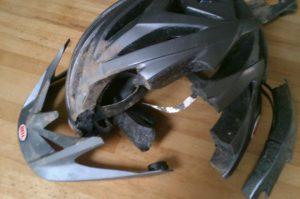 This article is from HELMETS.ORG, specifically, shouldi.htm. Reprinted here ensuring viewing by a greater audience.
This article is from HELMETS.ORG, specifically, shouldi.htm. Reprinted here ensuring viewing by a greater audience.
The topic came up the other day when someone posted a picture of a group ride saying how much fun it was. I replied with “all except the guy in the back without a helmet.” You wouldn’t have believed the backlash I took since this was one of their ‘world champ’ celebrities I made a comment about. There were over 100 replies with 95% against me for mentioning that this person should have been wearing a helmet.
Of course, reading their comments, there was no merit or common sense behind any of their arguments. Responses such as “he’s a world champ, he’ll never crash”, “he knows how to handle a bike better than you so he’ll never crash”, etc. etc. The most idiotic response was “did you know that you are more likely to get a head injury while taking a shower than riding a bicycle” <- WRONG!
I asked a friend of mine, a very bright individual who just got his PhD, what drives a group of people who should know better AND seemingly all wear helmets to turn on someone – is it mob mentality? He laughed and told me to look up the following 2 links in urbandictionary.com; LINK#1, LINK#2 . Bingo!
So I logged into helmets.org and found this great little article. Not only this article, but there is a lot of other useful information about helmet designs, what’s new, etc.
Here is a link to the statistics -> STATS
Helmets.org is a great site with a lot of useful information – spend some time there to look around!
————————————————————
Should I Wear a Bike Helmet?
Summary: We are helmet advocates, so you know our bias, but here is some food for thought about the current push to disparage bike helmets.
Our own belief, of course, is that a cyclist should wear a bike helmet. We are helmet advocates, after all.
In 2010 we saw an increase in blog posts from cyclists who do not believe you should wear a helmet. They challenged the conventional wisdom that helmets are necessary to reduce brain injures. That has continued now for the intervening years. The positive experience with shared bicycle programs has raised basic questions about the need for helmets, and some riders are reconsidering.
First, for views opposing ours
- The Bicycle Helmet Research Foundation. Their Policy Statement page explains where they are coming from.
- Mikael Colville Andersen’s presentation to TEDx, disparaging helmets and helmet promoters. He says car manufacturers are pushing helmets because they fear that bicycles will take over the cities. We have a response to his presentation.
Questions you may want to ask
- Is there evidence that helmets protect brains and heads? We have a statistics page that may help you research that. Don’t miss the recent New York City data showing that 97% of their dead cyclists had no helmet.
- Do cyclists crash? Do bare-headed cyclists injure their brains more often? Again our stats page may help.
- What is your general level of risk-avoidance?
- adjust your brakes when they get worn
- use active lights at night
- swim in thunderstorms
- wear seatbelts in a car
- pinch grounding prongs off electrical plugs
- have a working battery in your home smoke detector
- shred railings on your skateboard
- ride a fixie with no front brake
- ignore sunburns
- drink non-organic milk
- drive or ride while intoxicated
- watch your weight
- exercise regularly?
- How important to you is thinking clearly?Only you can answer that one. Do you have a lot invested in training your brain? Is anyone else depending on you to function?
- Who should you listen to?On all sides you hear “studies have shown” followed by a mix of information, misinformation, fabrication and outright prevarication. Studies have indeed shown things, but some are much better than others, and sorting it all out is not easy.Given that most of us have a bias, your best source of information is probably the real world. You can go to a meeting of a local cycling group who ride the way you do: recreational clubs, commuter organizations, urban riders, touring riders. Ask the people who ride a lot in your own area. Don’t let anyone sneer at that “anecdotal” evidence. It’s the real world, not somebody’s take on what happens somewhere else with a different road culture or even a nationwide generalization using bingo numbers gathered on the telephone. The answers could be different for the riding you do, and might not agree with what “studies have shown” or what somebody in Copenhagen thinks.
- Why does the injury prevention community advocate helmets? Why are emergency room doctors among the strongest advocates?The doctors see the injuries, close up and personal. The injury prevention community believes helmets are the best short-term intervention for reducing cyclists’ brain injuries while we are improving the safety of roads and other facilities.
- Why are we not screaming at you to “just wear a helmet”?Cyclists think for themselves (or they would not be cyclists!) and always debate things that seem settled. Over the years they have gone to the mat on both sides of eliptical chainwheels, solid tires, 26/27/700C/29″ wheels and whether or not wheels stand on the lower spokes or hang from the upper ones. We think most of the anti-helmet arguments stem from either resentment about being told how to ride, the libertarian ethic or just the urge to oppose anything that the majority seems to be mindlessly going along with. The one valid concern would be if helmets discouraged cycling, but we have no indication of that in any US city or state where actual rider counts have been done. The success of shared bicycle programs, and their low rate of reported head injuries, may challenge that. Those programs will not attract as many casual users if helmets are required. And more recently there have been those who feel we are just not taking enough risks in our lives.Re-examining views on safety is always appropriate, even though the level of discussion on this topic is more heat than light, and not likely to produce progress. We are surprised that after examining the evidence people would consider riding without a helmet because somebody posting on a blog thinks it’s not necessary, or somehow detrimental to cycling. But every rider is of course entitled to their opinion, so here we try to offer some food for thought, never pretending that we are not biased.
Do you:
Maybe the conventional wisdom comes from people who have different ideas about taking chances.
For studies
Harborview Injury Prevention Center’s summary of helmet effectiveness studies.

I have always enjoyed bicycling and, through a series of coincidences, became a Bicycle Industry Consultant and Product Tester. I test prototype products for companies and have published only off the shelf production products on biketestreviews.com.


